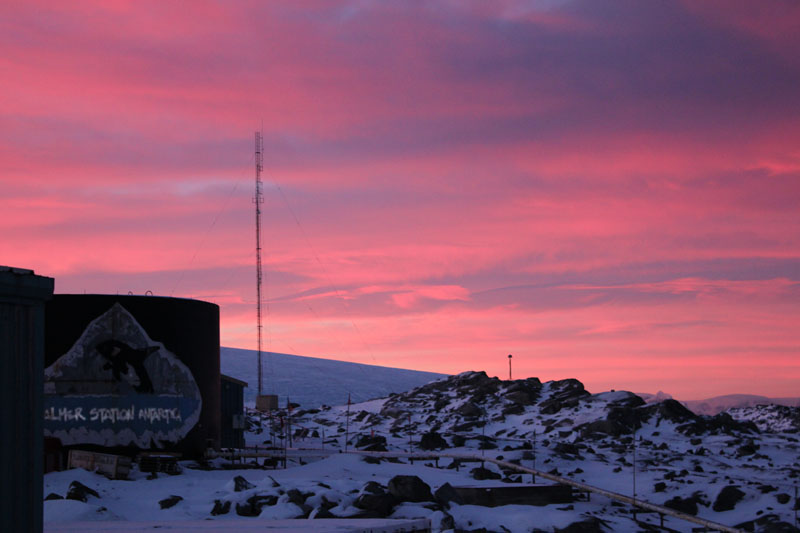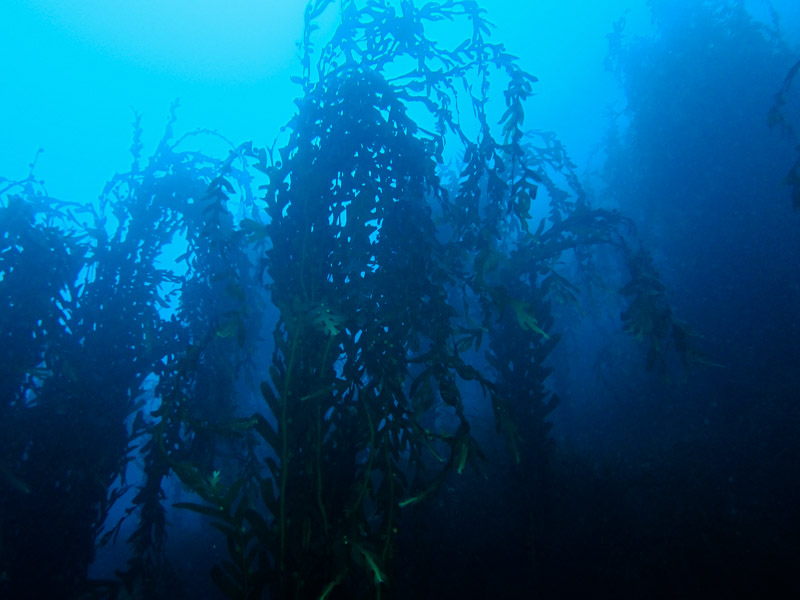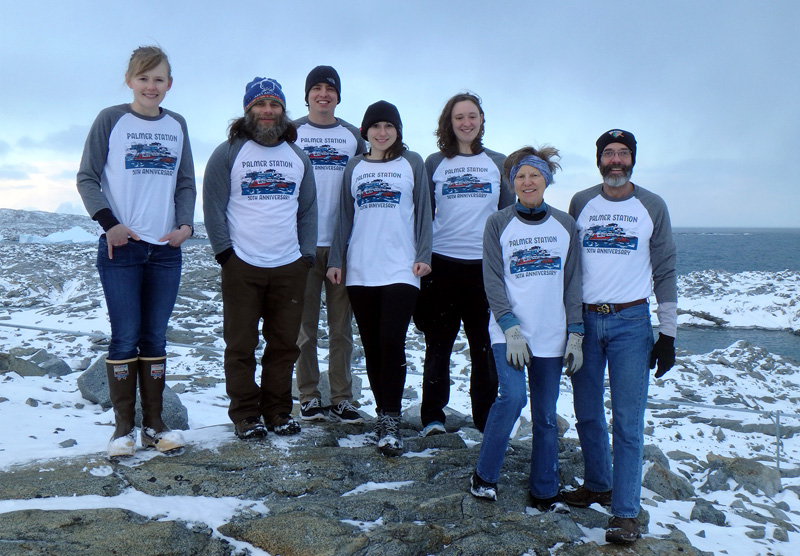
A mesmerizing symphony of pastel reds and blues entranced Palmer Station and many a camera the other morning. The shifting color palette not only soothed and appeased our gray-weary community; the lively color medley energized us as well. This was the undeniable dawn of a new day and in retrospect for me a harbinger of the coda – shifting, waiting in the wings….
All symphonic works have a final movement and so too does UAB in Antarctica (UAB in A). Today’s submission are the final measures of what we have been orchestrating during our months down here. Do not despair, today is not the day the music of science and living at Palmer Station dies! Rather, we are passing the baton to a new, one-man band who will continue chronicling the science and adventures of our last weeks on station. An introduction awaits the patient reader following this encore/wrap-up.
It seems not so long ago that Team UAB in A was planning and packing (enough shampoo!) for our four month stay in Antarctica. Palmer Station is a great home away from home and our neighbors, penguins (!) are the best. We have enjoyed our many opportunities to explore near and even relatively far thanks to our “lucky star” – the RHIB Hadar (named for one of the indicator stars pointing at Crux, the Southern Cross). Team members have trekked in an historic flag-planting expedition, experienced a whale of a day helping a cetacean group and even participated in an international cycling event.
Of course, we are in Antarctica for science. Our science this season has been very successful and would have been very different had Sabrina not been reunited with her transplanted Plocamium (Ploc) experiment. Thanks no doubt to the request of you to “keep fingers crossed”, the experiment did indeed remain free of sabotage by icebergs for the planned duration of an entire year. Phew! Thank you for the positive vibes! Similarly, neither wind, snow nor wayward bird impeded the ultimate success of the project’s other long experiment featuring gastropods and brown algae.
Some of our science-related activities were of shorter duration or steady paced all season. CJ sampled not only sea stars but like everyone on station, many a yummy home-baked goodie! Michelle, in this her first polar foray, achieved antarctic naturalist status so naturally ran the tourist touch tank. Other science activities are ongoing, like the Ploc transects and Andrew will continue doing laundry in the lab until the very last day we have to pack up the gas chromatograph. He has already run over 400 Plocamium extracts through and the instrument remains hungry for more! Between the transplant experiment and the chemistry of Ploc, maybe someday soon Plocamium in Antarctica will have its own name. Over the years investigating the chemistry of critters has helped us better understand the chemical ecology in local organisms like “bags of water” and cactus sponges.
During our four-month stay, UAB in A has logged 30 blogs and, so far, 130 buddy team scuba dives. The divers, especially lead diver Chuck, have spent a lot of time getting ready to dive into ice baths in order to swim through swim through Antarctica’s forests whilst buddy Sabrina digitally captures them underwater. All divers have individually logged at least a cumulative 24 hours underwater. That also means diver tenders have logged over a full day standing in the zodiac watching divers’ bubbles. With such much logging going on there really are forests here!!

Palmer Station as a facility is so accommodating to science and scientists. The aquarium room doubled as an all-inclusive hotel providing pampered lodging, including all you can eat “Brussels sprouts” to over 500 amphipod guests and a maternity ward for sea stars and snails. One of Palmer’s science offices was a temporary sound booth for Jim when National Public Radio interviewed him. Jim later weathered an on-camera interview at a GA television studio about his continuing efforts to check on Antarctica’s changing climate. The Palmer pier once again was the site for our project’s annual fishing derby.
Palmer as a community is head-over-heels accommodating to science. It really does take a village to do our science. For instance, almost the entire station participated in Palmer’s small effort to clean up the planet during our project’s Earth Day dive but every day for this community is a day of environmental stewardship. We are delighted when Palmer’s staff day off is unanimously enjoyed in a myriad of ways, including wildlife watching and skiing in ‘AntARTica’. What is not to celebrate this community for science Palmer Station!
Quoting an old song – “To everything there is a season turn, turn … and a time for every purpose….” For UAB in Antarctica the time to go has come. Our final weeks on station will be chaotic finishing experiments, breaking down labs, cleaning dive gear and packing, packing, packing leaving little time to share more science and adventures with you. Do not despair – as scripted above – UAB in A segues to a solo voice. Without further ado, it is my pleasure present PolarTREC high school science teacher extraordinaire Keith Smith (second from left in group photo below). Keith was selected from a large pool of applicants nationally to the NSF-sponsored PolarTREC program. About a dozen educators, mostly K-12 teachers, nationally are selected each year through PolarTREC to join research programs such as ours in the Arctic and Antarctic as a way to bring polar science alive to their students, other elementary and secondary students, and the general public throughout the United States. We are very fortunate that PolarTREC selected us as a host for one of these exceptional educators and are excited to be working with Keith for the last weeks of our time here.

Finally, to paraphrase the closing of UAB in A’s initial entry: Come along with our new team member Keith for fresh perspectives and more adventures in Antarctic science.